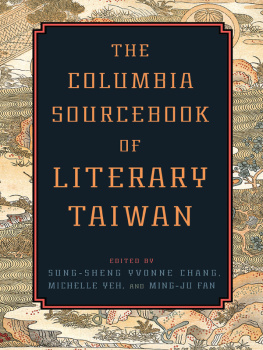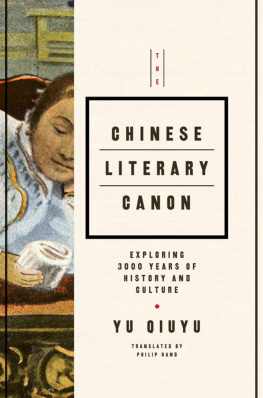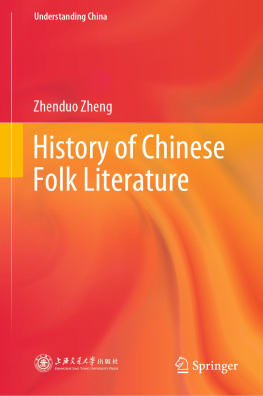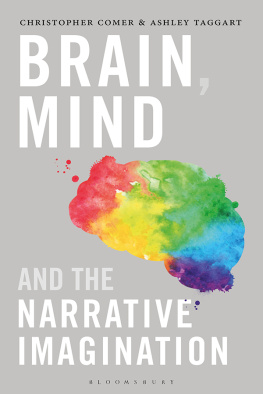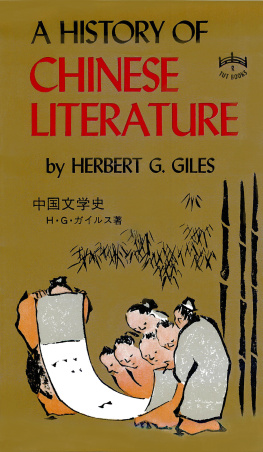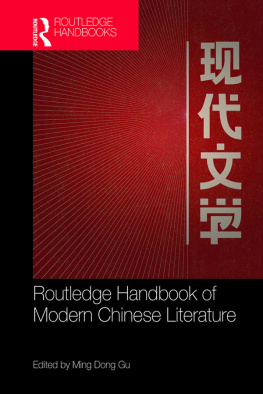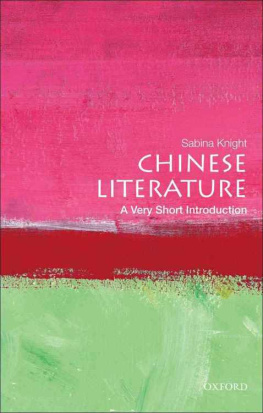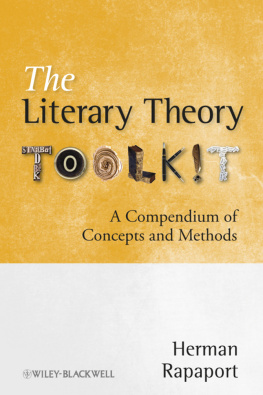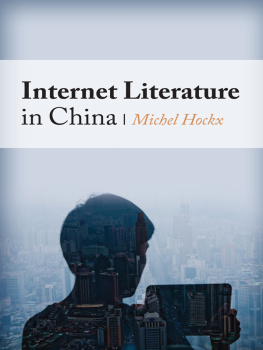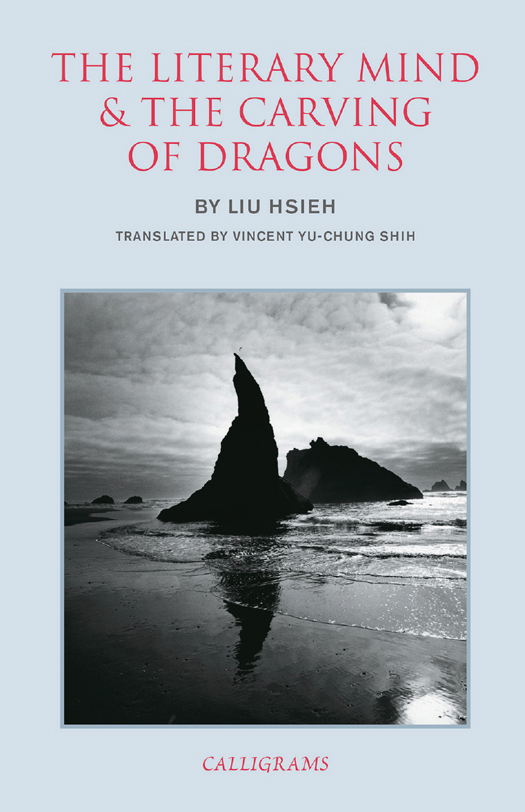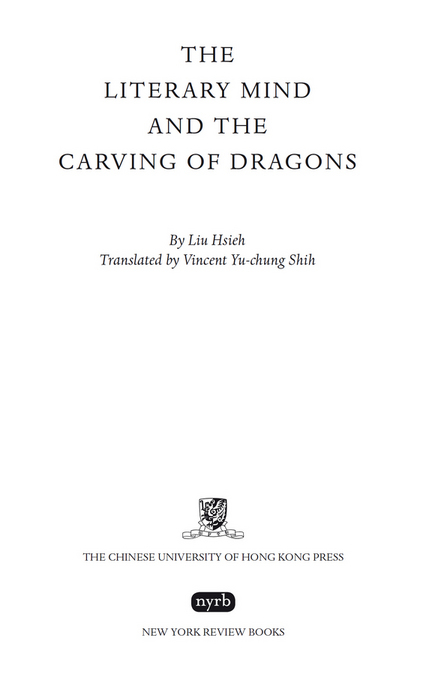Calligrams
Series editor: Eliot Weinberger
Series designer: Leslie Miller
The Literary Mind and the Carving of Dragons
By Liu Hsieh
Translated by Vincent Yu-chung Shih
1959 by Columbia University Press
Revised edition copyright 1983 by
The Chinese University of Hong Kong
New revised edition copyright 2015 by
The Chinese University of Hong Kong
All rights reserved.
A catalog record for this book is available from the Library of Congress.
ISBN: 978-962-996-585-3
Published by:
The Chinese University Press
The Chinese University of Hong Kong
Sha Tin, N.T., Hong Kong
www.chineseupress.com
New York Review Books
435 Hudson Street, New York, NY 10014, U.S.A.
www.nyrb.com
eISBN 978-962-996-931-8
v3.1
In memory of my wife
Shih-I Wang Shih
Contents
The Literary Mind and the Carving of Dragons
Introduction
I. Development of Literary Criticism Before Liu Hsieh
Liu Hsieh (c. A.D. 465522), in his Wen-hsin tiao-lung, or The Literary Mind and the Carving of Dragons, gives a comprehensive treatment of literary theories and critical opinions from the earliest period to his own time. As a critic, his genius is demonstrated by the exhaustive and penetrating manner in which he deals with literary and rhetorical problems. For a better understanding of his insight, a brief survey of the development of literary criticism in ancient China will be of great help, for here we shall find the main sources of his inspiration.
Literary opinions in ancient China developed and expanded as literary writing advanced. The first traces of such opinions are found in the Book of History. Poetry is the expression of sentiments, and songs are these expressions set to music. Tones are prolonged according to rules of prosody and intervals chosen according to rules of harmony.predominantly lyrical in nature, and intimately linked to music. The songs and odes in the Book of Poetry conform very well to this patterna pattern which may be considered purely literary.
The term chih, which I translated as sentiments or emotions, has two senses: sentiments or emotions, and will or idea. As will and idea, it points the way to a didactic interpretation of literature; and as sentiments and emotions, it leads to a lyrical conception of poetry.
The philosophical period in ancient China was in many ways analogous to the golden era of classical Greece. Many incidental remarks on literature were made by philosophers, whose primary interest was not in literature as such, but rather in philosophical truth. Thus their critical judgment was basically ethical rather than esthetic. In China, Confucius and others after him valued art chiefly for its moral effect on the conduct of the people, frequently mixing moral with literary and poetic issues. In Greece Plato, alarmed by the unhealthy effect of poetry, banished poets from his city state. Of the two, Confucius was perhaps the more enlightened. He not only included poetry as one of his main texts for instruction but also told his son and disciples to study and imitate its disciplined artistry in order to improve their ability to express themselves.
This apparent love of beauty of form on the part of Confucius, however, is completely overbalanced by his underlying utilitarian motive. This utilitarian attitude is most clearly indicated by his remarks on the Book of Poetry. He said:
The odes can stimulate the mind, train the observation, encourage social intercourse, and enable one to give vent to his complaint. From them one may learn how to fulfill the immediate duty to ones father, and the remote duty to ones ruler. And in them
Once he characterized the whole Book of Poetry by one single line: It has no undisciplined thought. The virtues of the Poetry being such, no Aristotelian defense of the poetic art is necessary.
However, it would be unjust to say that Confucius lacked esthetic appreciation and sensitivity. We are told that at one time he was so enthralled by the beauty of the Shao This subjective experience, however, did not influence his attitude toward art. Because of his authority elsewhere, his didacticism was also firmly established as one of the chief traditions in the field of literary criticism.
After Confucius came Mencius and Hsntzu, who continued to perpetuate and develop this tradition. Both Mencius and Hsntzu were classical scholars, quoting the Six Classics extensively in their works. In their discourse on the Poetry, both emphasized the ethical and cultural values as did the Master. Mencius, however, with his idealism and mystical leanings, was able to adopt a freer approach to literary problems. Maintaining that the Poetry should be elucidated in an enlightened manner, he said:
Therefore, those who comment upon the Book of Poetry should not because of one term misconstrue the meaning of a sentence, and should not because of a sentence misconstrue the original idea. They must try with their thoughts to meet that idea, and then they will apprehend it.
This plan for a freer interpretation of creative literature displays an insight unique in antiquity.
It is true that a purely intuitive or subjective judgment is extremely hazardous and in many instances nothing more than a
The evil of Mencius subjective approach is mitigated somewhat by another theory of his that a work should not be considered in isolation, but in the total context of the life and time of the author.
An even more important contribution is contained in the famous theory of yang-chi, the fostering of the vital spirit or breath. The nature of this breath or spirit (chi), as conceived by Mencius, is clearly ethical. Mencius said,
Such is the breath (chi): it is most great and most strong. Being fostered by uprightness and sustaining no injury, it fills up all between heaven and earth.
Such is the breath: it is the correlate of righteousness (i) and moral principle (tao). Without it man is starved. It is produced by the accumulation of righteous deeds, and not to be obtained by incidental acts of righteousness.
It is clear that the term chi (breath, or vital life or spirit) stands for that moral quality which is attained through a moral life. But when he talked about the nourishing of vital force, he also talked about chih-yen (to know ones character through his words). This seems to have some literary implications. The vast and expansive vital force is the characteristic of a high moral person who has the moral courage to speak his mind undaunted and unafraid. When this courage is expressed in words, the words will have strong reason back of them; they will have power and irresistible forcefulness. They would give literary works styles such as hsiung-hun (bold and dauntless), ching-chien (vigorous and powerful), hao-fang (heroic and gallant), and piao-i (high flown and transcendent). So in later development, it seems to have undergone a shift in meaning, a shift from the moralistic pure and simple to a sense which is at once moral and esthetic. It is in this latter sense that the term



